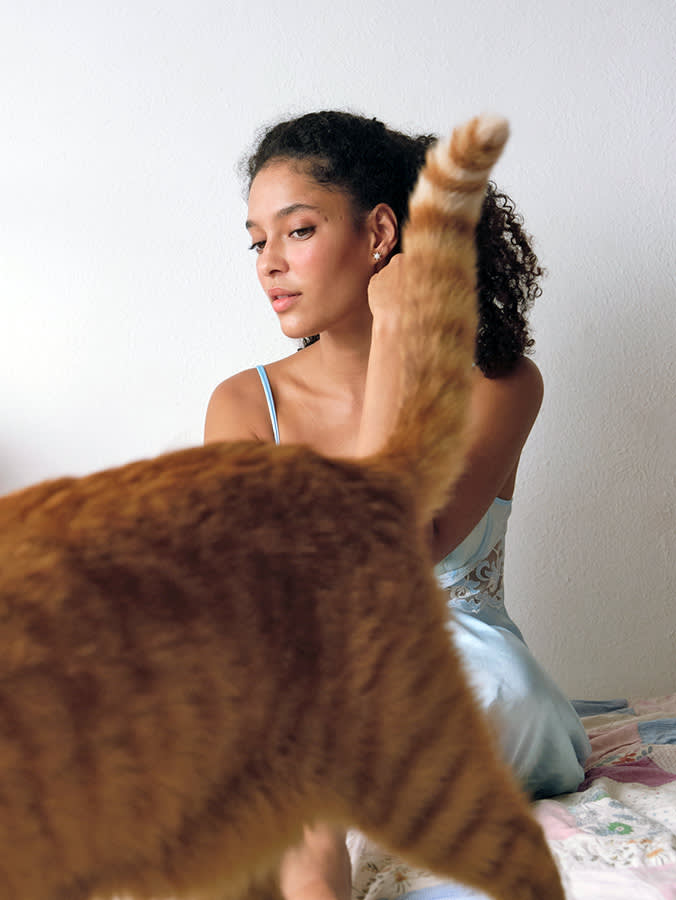Why Does My Cat Pee on My Bed?
It’s a clear sign something isn’t right.

share article

Your pet wants you to read our newsletter. (Then give them a treat.)
In This Article:
Medical Issuesopens in a new tab Stress and Anxietyopens in a new tab Litter Box Problemsopens in a new tab Urine Markingopens in a new tab
One of the best things about sharing your life with a cat is not having to take them outside for a walk every time they need to pee. While puppy parents are bundling up in the cold and getting soaked by the rain, we cat people can be cozy on the couch, knowing our feline friends are just fine using their litter boxes opens in a new tabwhen nature calls.
If you read that and thought, “But my cat pees on my bed!” then you’ve come to the right place. In spite of generally being conscientious and tidy about their litter box habits, sometimes cats pee where they shouldn’t — namely, where you sleep. If your cat pees on your bed, you may even be wondering, “Why does my cat pee on my bed on purpose?”
Finding your cat has peed on your bed is unpleasant, but it’s important to remember that cats, known for being clean creatures, typically have an underlying reason for peeing outside of their litter box. Common causes include UTIs, stress, litter box preferences, and marking behaviors.
Veterinarian Dr. Preston Turano tackled a few common questions about why your cat won’t stop peeing on your bed. Keep reading to find out what might be causing this distressing behavior — and what to do about it.
Medical issues
Dr. Turano says that if a cat parent asks, “Why does my cat pee on my bed at night?” the answer may be a medical problem. “When cats pee outside of the litter box, it is referred to as ‘inappropriate urination.’ This can either happen from an underlying medical concern or a behavioral issue,” Dr. Turano says.
“Numerous underlying medical concerns can cause a cat to have inappropriate urination on a bed or around the house,” Dr. Turano says. “They range from bladder issues, like infection, stones, or crystals to systemic issues like diabetes.” He emphasizes that the only way to determine the underlying cause is through a veterinary exam and lab work, including urinalysis and blood work. Medical issues that can cause your cat to pee on your bed include:
Urinary tract infections (UTIs)
UTIs are quite common in catsopens in a new tab. Symptoms include frequent peeing, straining, dribbling pee outside the litter box, bloody pee, and vocalizing while using the litter box. Your cat’s vet can diagnose and treat a UTI, if this turns out to be the culprit.
Bladder stones or crystals
Cats have sensitive bladders — like delicate balloons. Anxiety may manifest in your catopens in a new tab as bladder problems, causing stones or crystals that interfere with normal peeing behavior.
Kidney disease or diabetes
If you notice your cat drinking a lot of wateropens in a new tab, a kidney problemopens in a new tab could be to blame. A thirsty cat may be a sick cat: Have them examined to see if they may have diabetes or kidney disease.
Arthritis
An older cat who pees on your bed may have arthritis; creaky joints can cause difficulty getting in and out of the litter box. If you have a senior cat, try getting them a litter box with low sidesopens in a new tab, so it’s easier for them to manage.
When to take your cat to the vet
“If you notice your cat inappropriately urinating around the house or on your bed you should contact your veterinarian immediately,” Dr. Turano says. “It could be a sign of an underlying medical concern.”
Stress and anxiety
If lab tests show no underlying medical issue that’s causing your cat to pee on the bed, Dr. Turano says your veterinarian can help you get to the bottom of the problem. “Often, behavioral issues arise from underlying stress, whether from other pets in the house to a bird feeder being placed outside a window.”
But don’t put the visit off or delay dealing with it. “You will want to correct the behavior immediately,” he says. “The longer a cat is inappropriately urinating around the house due to a behavior concern, the more difficult it becomes to correct.” Your vet can help you come up with a plan to get your cat peeing in the litter box again — every time.
A few of the things that may cause your cat stress that leads to litter box problems include:
Changes in routine or environment
Have you moved, changed your schedule, been traveling, or rearranged the furniture at home? Any of these things may cause a temporary hiccup in your cat’s house training.
New people or pets in the home
A new roommate, additional family member, or houseguests can put your kitty off their routine and cause behavioral problemsopens in a new tab. If you’ve ruled out a medical issue and this applies to you, give your cat some time to get used to the new people (or pets!) in their home.
Lack of mental stimulation and enrichment
How frequently are you playing with your cat? It’s possible that their penchant for peeing on your bed is their way of asking for a little more engagement. That’s right: Your cat could simply be bored and taking it out on you. Solving your cat’s pee problems could simply be a matter of picking up a few fun new toysopens in a new tab and setting some time aside for dedicated cat play time.
Using pheromone diffusers and calming aids
Products — such as Feliwayopens in a new tab, a synthetic version of your cat’s facial pheromone — can help calm a catopens in a new tab. Your vet can recommend specific products that may help your cat, if anxiety is causing them to pee on your bed.
Litter box problems
Besides medical issues and anxiety, litter box troubles can be behind a cat peeing on your bed. A few of the more common litter box woes that may cause a cat to pee elsewhere include:
Not enough litter boxes for number of cats
We get it: If you live in a small space with more than one cat, it can be difficult to find space for multiple litter boxes. Still, it’s ideal to have one for each cat, plus an extra. Getting creative with litter box cover furnitureopens in a new tab may help!
Infrequent cleaning or undesired litter type
Cats like a clean litter box just as much as you like a clean toilet! You don’t have to keep it sparkling clean, but scooping it a couple of times a day and hosing the whole thing down (with a little mild soap scrub) will help keep the litter box appealing for your cat. (Or should we say, a-pee-ling?)
Litter box location or accessibility issues
Put the litter box in as secluded a spot as you can, so your cat has privacy when they need to go. Make sure it’s still accessible, however — and if you have a kitten or an older cat, make sure they’re able to get in and out of the box easily.
Urine marking
“Cats typically mark their territory as a way to deal with stress,” Dr. Turano says. “It may be a way to say, ‘This is mine,’ or to leave a familiar scent, which provides comfort.” Here are a few things to know about urine marking:
Unneutered males are the most likely to spray
Why does your male cat pee on your bed? Well, is he neutered? If not, this is just one reason you’ll want to get that taken care ofopens in a new tab as soon as possible.
Females may also mark territory
Male cats aren’t the only ones to spray; they’re just most likely to. But a female cat can also mark her territory. If your female kitty is peeing outside the box — whether on your bed or anywhere else — she could be getting territorial.
Anxiety or stress can trigger-marking
A stressed-out cat may react by sprayingopens in a new tab. New people in your household, a move, or any other major change could be the reason behind your cat peeing on your bed. (And if you have a dog in the household, your cat is not above peeing on your dog’s bed, too.)
FAQs (People also ask):
Can a UTI cause a cat to pee outside the litter box?
A UTI can certainly cause your cat to pee outside their litter box — whether that’s on your bed, your dog’s bed, the rug, or anyplace else. If your cat randomly pees on your bed, your veterinarian will likely test for a UTI, along with checking to see whether another medical issue is at play.
How can I house train my cat?
House training a cat is much easier than teaching a puppy the ropes of proper peeing and pooping. Cats are generally easy to house trainopens in a new tab; they seem to know what to do instinctively. Choosing the right litter boxopens in a new tab, trying out different types of kitty litter until you find one that works for your cats (and for you!), and keeping your cat’s litter box clean are all keys to effective litter box training.
Why does my cat pee outside his litter box?
If you’ve ruled out medical issues and your car is still peeing outside the litter boxopens in a new tab, take a look at where the litter box is located, how clean it is, and how many cats are using it. Cat behaviorist Stephen Quandtopens in a new tab goes by the “N+1 rule,” which means having one litter box for each cat in your household, plus one extra.

Elizabeth Laura Nelson
Elizabeth Laura Nelson is a writer and editor based in Brooklyn, New York. As a child, Elizabeth was scared of cats (claws and teeth, yikes) but she has since gotten over her fear and now shares her home with three sweet and gentle feline companions who make life better (and cuddlier) every day.